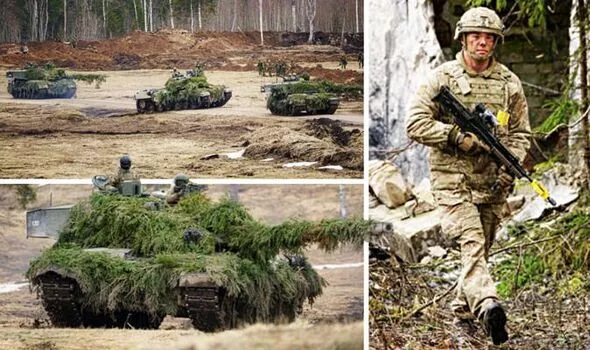Around 1,600 British troops are now stationed in Estonia as part of a NATO battlegroup tasked with protecting the nation, which shares a 183-mile border with Russia.
Military commanders can also draw on around 30 Challenger II battle tanks and 60 armoured vehicles from the Royal Tank Regiment.
And NATO battle group commander Lieutenant Colonel Ru Streatfeild said his forces are “100%” ready if Vladimir Putin orders an invasion of Estonia, adding that “our soldiers are incredibly happy to be here.”
However, it is a “immense duty,” he added, adding that he has a combat plan in place in the case of a Russian invasion.
British troops said that their extensive training might be a deciding element on the battlefield, adding, “You could have all the stuff in the world, but if you’re not confident using it, it’s not going to get you anywhere, is it?”
Yesterday, the Daily Express accompanied British troops on the frontlines in Estonia, where they trained alongside Danish and French colleagues.
While the Western allies practised hitting a target on two axes, Estonian forces defended the location.
An RAF typhoon sailed by just as Britain’s Challenger II battle tanks fired on targets in an attempt to maintain their position.
Estonian authorities warned the Daily Express that they “must presume” Vladimir Putin would invade their nation one day.
“It’s not that people enjoy it. Soldiers, on the other hand, desire to execute their duty. They want to put their skills to the test.
“If you walk around now and talk to troops, you’ll see that they’re buzzing.
“This is why they join the Army.”
“Our warriors are ecstatic to be here. It is a tremendous honour. But it also comes with a great deal of responsibility.”
“It is to protect,” the British commander explained of his job. It’s a simple thing to utter, but a difficult task to do.”
“We are getting to know this area pretty well,” said the fighting group leader, adding that he “definitely” understands how he would repel a Russian assault.
Lt Col Streatfeild said of the Ukrainian ambush tactics and the possible lessons NATO allies may learn: “There’s nothing new, really.” What you’re witnessing around here is known as a combined arms manoeuvre.
“This is where tanks, armoured infantry, engineers, artillery, and logistics are all working together.”
“Each nation contributes a unique set of talents, customs, and mindsets. They do, however, compliment one another.
“Whether you’re attacking or defending, you want to be able to bring as much of your weaponry to bear as possible from as far away as feasible.”
“It’s similar to having notes on a piano.” A song is not defined by a single note. It’s all about how you play it and tie it all together.
“That is what war fighting is all about: putting together a combined weapons combat force.”
“Any situation you enter, in any type of war fighting, even in defensive postures, is a struggle of wills.”
“When you go into war, you want to be able to exploit flaws, you want to be able to exploit weaknesses, and you have to be prepared for them to do the same to you.”
“A lot of this is about preserving your own weaknesses while also attempting to attack theirs.”
“Some of the families required time to comprehend our position since deterrence is such a key aspect of not only security here in Estonia, but security of Western liberal principles and all sorts of stuff that we take for granted,” the NATO commander disclosed.
“But I believe people were very settled once they saw that being here as part of NATO is helping to it.”
“I have a unit welfare worker who is now trying extremely hard to keep all the families together.”
“I believe there is anxiety, yet it is so simple to remain in touch with family nowadays.” So, once they realise they’re out here and established, I believe a lot of the
“It doesn’t really bother me,” said Gunner Joe Watson, who joined the Army at the age of 16. We enlisted in the Army for a cause. You must constantly be prepared for it.”
“As a Gunner, you don’t really think about it,” the Wakefield, England, 19-year-old stated. You simply perform your job and strive to do it properly.
“There is some dissatisfaction [that British troops are unable to assist Ukraine on the battlefield. Every soldier desires to serve in the military. You must be aware of this before you join up. If we do go, there will be a purpose for it. Everyone is aware of this.
“Everyone realises that if we go, it will be a tremendous deal.”
“However, we are focused on defending Estonia.” That’s precisely what this is.
“I’m honoured to be here. I believe that many Estonians are grateful for the presence of the British Army, particularly the armoured forces. And it makes you really pleased to be in this position.
“I have a tiny family, and they are handling it well.” My father is obviously very proud of me. To be honest, they are all pretty proud.
“This is what the British Army is about, not having the greatest equipment.” However, we have the best-trained military. Nobody is better trained than us.”
“We learned about the conflict while we were out undertaking training exercises in Germany,” said Lance Corporal Rhydian Stephens, from Ammanford, who is assigned to the Royal Welsh as a B-company medic. That’s why we joined the army.
“We enlisted in the army to aid.”
“But for the time being, we’re simply observing what’s going on in the news and doing what we need to do here in Estonia first.”




















